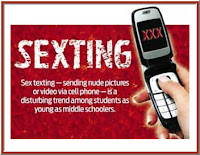 10-25-2012 Pennsylvania:
10-25-2012 Pennsylvania:
S LONG AS there’s a cellphone in practically every teenager’s hand, it’s inevitable that young people’s practice of texting sexually explicit images will continue to pose a troubling problem for police, prosecutors, school officials and parents.
With the so-called sexting trend already years old, it’s at least a hopeful sign that so many state officials are trying to come to grips with outdated laws on child pornography.
Harsh antiporn laws – accompanied by imprisonment and lifelong assignment to sex-offender registries – clearly are ill-suited to dealing with actions that stem more from youthful excess and normal sexual experimentation rather than any criminal intent.
Yet, the best strategy for dealing with sexting is anything but clear. Last week, Pennsylvania lawmakers became the latest to grapple with the issue, approving a set of tiered penalties that wisely go easy on the original sender of an explicit message. Under no circumstances will texting result in a child’s incarceration, which is an important reform.
Declaring sexting a summary offense similar to underage drinking makes some sense, since there’s broad consensus that the best way to stem sexting is through counseling and the maturation that comes with time.
In general, the legislation authored by state Rep. Seth M. Grove, R-York, represents a well-intentioned effort. It had the support of the state’s district attorneys’ organization, which urged reduced sexting penalties.
Where Harrisburg lawmakers still might have been wide of the mark, though, was with their decision to make it a third-degree misdemeanor for anyone who forwards a sexting message. Worse, the use of a picture to harass or cyberbully would be punishable as a second-degree misdemeanor.
The nature of teens’ rapid-fire communication through phone texting makes it almost inevitable that such images will be forwarded. For officials, though, it could be difficult to assess whether those forwards represent anything more than just another youthful impulse. Nor is it likely that the youngest teens will grasp the potentially grave legal implications from merely clicking the forward key. Any foray into the courts for these cases also risks revictimizing teens, as the offending photos become part of the court record.
Nonetheless, Gov. Tom Corbett is expected to sign the legislation approved in the end-of-session rush in Harrisburg. So it will be critical to monitor whether the rules help or hinder dealing with the sexting fad. ..Source.. by Times Leader
October 25, 2012
Teen sexting law will need scrutiny
Subscribe to:
Post Comments (Atom)

No comments:
Post a Comment